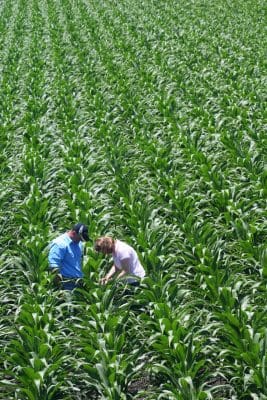THE changing role of farm advisers in an era where demand is not only for cropping advice, but environmental stewardship and supply chain needs, emphasises the importance of agronomists keeping up with the times and continuing their professional development.
 That was the message International Plant Nutrition Institute director, Dr Tom Jensen, Alberta, Canada, put to the 18th Australian Agronomy Conference in Ballarat, Victoria, this week.
That was the message International Plant Nutrition Institute director, Dr Tom Jensen, Alberta, Canada, put to the 18th Australian Agronomy Conference in Ballarat, Victoria, this week.
Dr Jensen said in North America and Australia over the past 30 years there had been a trend away from government extension services supporting growers to grower advice provided through corporate or private consultants and advisers.
In North America, a recent survey asking farmers where they obtained agronomic advice indicated that agricultural retail staff were the most mentioned group (60pc), government extension (20pc), private consultants (10pc), and the balance from the internet.
“A lot of the advice going to farmers now is coming through the private system,” he said.
“We have seen a change in the demand for knowledge. Unfortunately, people aren’t very patient nowadays. They want the answer and they want it now.
“And they want a good answer. The trouble is sometimes we can get quick answers, but they are not always accurate. The information on the internet is useful and fast, but it is not often checked to see how accurate it is. We need to keep up the quality of the information going to farms.”
Dr Jensen said new demands were forcing the agricultural consultancy industry to change the way it did business.
“What we are seeing in the industry is a change in what we do as agronomists. Environmental stewardship is becoming more and more important. There is also a huge change in supply chain accreditation,” he said.
“In Canada we are seeing a large interest in precision agriculture. It is estimated 4 to 5 per cent of the farming land is now using precision agriculture with variable rate application. Most of the technical support is coming from private consultants or private consultant groups working with large ag retailers.”
Dr Jensen said it was vitally important to have trained and confident people as agronomists in the industry.
“Continuing professional development is the most important thing. It is good to have training at school (college), but I know I learned a lot more after I graduated than what I did at school,” he said.
Outside government funded extension services, there are about 4000 “agronomists” in Australia supporting around 86,000 farm businesses covering around 70 million hectares of crop and managed pasture with a gross value of $56 billion. This is around one agronomist for each 20 businesses and 80,000ha.
In North America, there are close to 3600 retail crop input outlets, 22,000 retail agricultural staff who advise farmers, 13,000 Certified Crop Advisers (CCA), and 3000 Certified Professional Agronomists. There are another 3000 private consulting agronomists that work independently of any specific agricultural retail outlet.




HAVE YOUR SAY